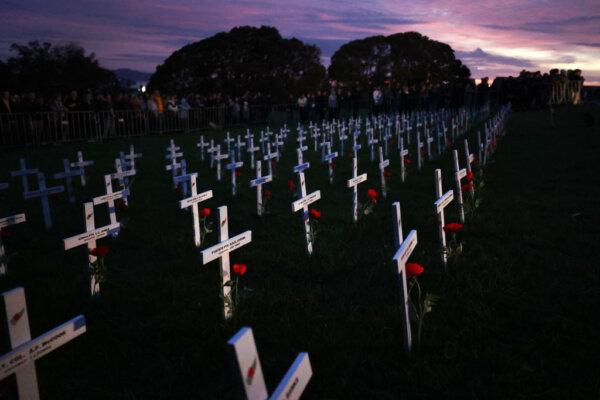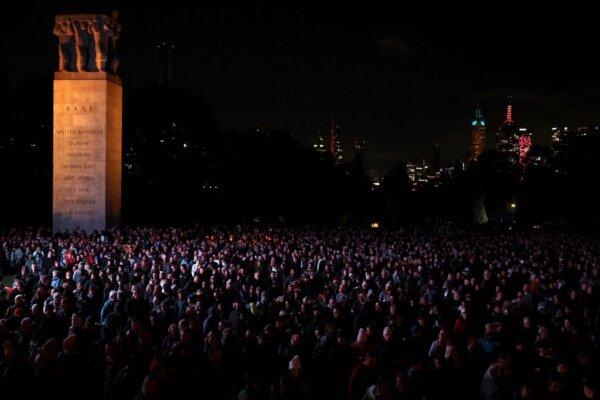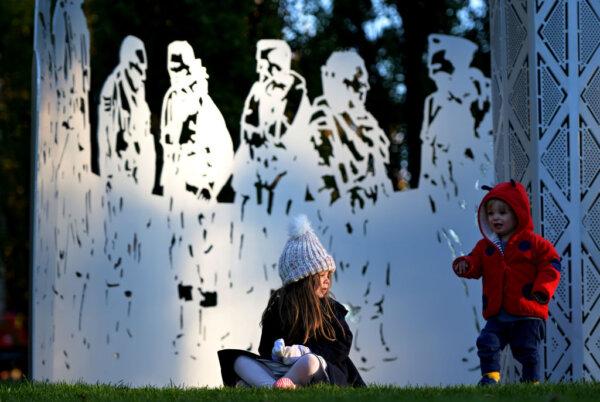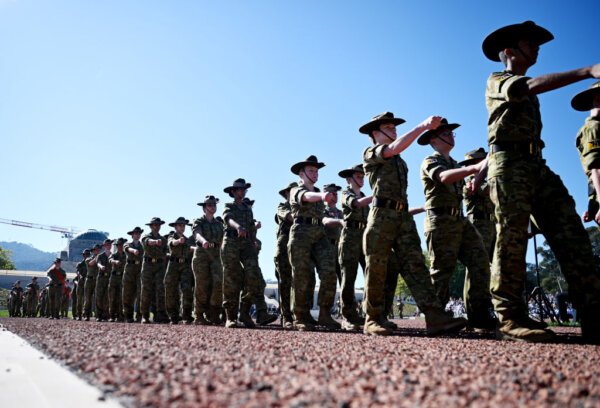The ANZAC Spirit is Needed Now More Than Ever
It is a unique feature of our country that our patriotic focus lies on a military defeat.
Commentary
On May 4, 1940, my father set sail on the Queen Mary, now a troop ship, heading to the Middle East to fight the Axis powers.
Among the 5,000 members of the AIF—the Australian Imperial Force—on board, my father embarked on this journey.
Watching from a small boat, my mother, like many others, bid him farewell all the way to the Sydney Heads.
At that time, no one believed the crisis would end soon, and the journey alone took weeks filled with peril.
Years later, my mother shared that most people were doubtful about the chances of victory.
Following year, Pearl Harbour was attacked by the Japanese, sinking the Prince of Wales and the Repulse, and capturing Hong Kong and subsequently Singapore.
At El Alamein, my father sustained severe injuries, never fully recovering, while his comrades continued to fight in the Pacific Theatre.
Despite the massive American support, the situation appeared bleak.
Australia braced for a Japanese invasion, as death ravaged cities like London across the globe.
The War to End All Wars
The courage displayed by the soldiers who fought in the wars and those who awaited their return fills us with reverence.
Especially when we reflect that just 22 years prior, World War I had concluded, with many families mourning the loss of their loved ones.

Every April 25, we mark ANZAC Day, commemorating Australia’s and New Zealand’s involvement in the Gallipoli campaign during World War I.
The campaign fell short of its goals, resulting in our troops enduring significant losses over many grueling months before withdrawing.
It is a rarity to find a country where a prominent aspect of patriotism centers on a military setback, but that holds true for us: hundreds of thousands, including numerous young individuals, gather for dawn memorials nationwide.
No other event resonates with so many people in such a deep manner.
While the battle may have been lost, the War was eventually won, as history shows.
However, the toll was immense! Sixty thousand Australians perished in the Great War at a time when our population barely touched five million.
There isn’t a town, even a small village, without a war memorial listing the names of the fallen heroes.
During the direst year of the war, 1917, 20,000 lost their lives in combat.
Try to fathom the impact on society.
Throughout the conflict, the government’s policy was to personally inform the next of kin of fallen soldiers rather than using telegrams: clergy members would deliver the heartbreaking news to the grieving families.
In my own family, a widow with two sons in the Army saw the Presbyterian minister coming up the path one day and met him outside:
“Which one of my boys is it?” she inquired.
“I regret to inform you, Mrs. Campbell, it’s both,” he replied.

Peace and Prosperity
I belong to the baby-boomer generation.
I narrowly avoided the Vietnam War draft, so my closest brush with warfare was in the school cadet corps, where we engaged in mock battles with real guns using blank ammunition.
Our post-WWII generation perhaps witnessed the most fortunate era in history.
We grew up during prosperous times. Our childhood unfolded amidst the increasing wealth and optimism of the 1950s economic boom.
Though the threat of nuclear war loomed, and conflicts like those in Korea and Malaya claimed the lives of many young individuals, they remained distant and, for the most part, left us untouched and carefree.
We believed that major world wars were a thing of the past.
The nuclear menace instilled fear but also acted as a shield. The possibility of atomic destruction focused our minds and made us cautious, preventing us from taking risks that might have lured our braver ancestors to battle.
I am truly appreciative of those days when the sun shone brightly, the streets were safe, and post-war immigration enriched our culture without overwhelming it.
Family bonds remained strong, and religion, while sometimes sidelined by our innate mischief, still held respect.
Traveling abroad was slower—affordable airfares were yet to come—but significantly faster than during Australia’s early settlement.
International phone calls were costly, but families separated by miles could communicate: a commonplace convenience now, yet almost miraculous then.
Radio was our primary home entertainment, but we cherished listening to adventure serials after school!
Our fathers understood that going off to war abroad meant potential years of separation, or worse, never coming back. A few weeks away was considered a dreadful deprivation by our generation.

In today’s world, marked by sophistication and cynicism, I worry for my children and grandchildren who must navigate its challenges. Despite their smartphones and tech savviness, they are deeply insecure.
We need to revive the ANZAC spirit, making it our own. Not just for those born into it, but for all Australians, regardless of their origins and cultural roots, as we are now all part of this grand tradition.
Opinions expressed in this article belong to the author and may not necessarily reflect the views of The Epoch Times.





